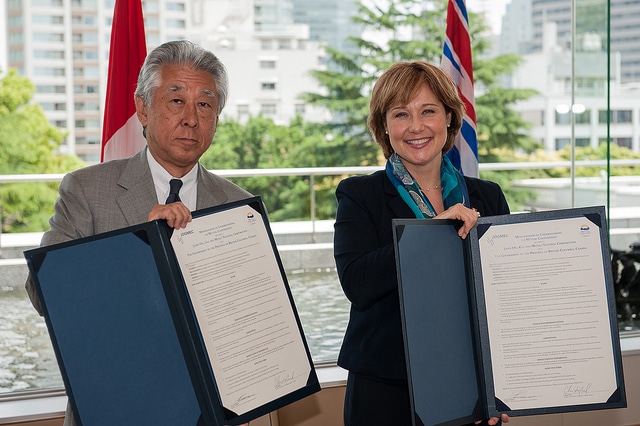Christy Clark, the premier of British Columbia, has joined the ranks of public officials the world over, which have clouded the definition of “clean energy” by using the term to seve their own interests.
In an effort to make good on her promise that the three new liquified natural gas plants under development along BC‘s northwest coast would be powered by clean energy sources, Clark has announced a new classification of the term “clean energy” in British Columbia.
According to the Premier, only natural gas that is used to power the LNG plants will be classified as “clean energy,” while keeping the classification of all other natural gas in the province the same.
The province’s Clean Energy Act of 2010, includes language that would allow natural gas to be redefined as a clean energy source under certain circumstances.
Speaking at an energy conference in Vancouver, Premier Clark said, “This is consistent with our comprehensive natural gas strategy and it’s also consistent with our efforts to use renewable energy.”
The natural gas strategy that Premier Clark’s government has rolled out is the key piece to its plan to build jobs in the province. In their strategy, the government says the LNG facilities will create as many as 9,000 construction jobs, 800 long-term jobs, and thousands of “spin-off” jobs. Additionally, the facilities will lead to over $20 billion in new direct investment in the province and over $1 billion in annual government revenue.
The plan is to have a pipeline transport natural gas derived from shale gas resources in eastern BC to these three new facilities on the coast. From there, the gas will be converted to LNG and pumped onto tankers where it will be shipped overseas to energy starved Asian markets.
With domestic natural gas prices so depressed as a result of over saturation, oil and gas companies are actively looking at ways in which they can export their inventory. Shell Canada, which would be the primary supplier of the shale gas, announced earlier this month that it was moving forward with the development of a $4 billion pipeline to transport natural gas to Kitimat, BC – the site of the province’s first LNG facility.
Premier Clark is adamant that her natural gas strategy will be beneficial not only for BC‘s economy but also for climate change and the environment.
At the energy conference she argued that exporting LNG to Asian nations such as South Korea, Japan, and China will lower emissions by helping them switch away from more polluting energy resources such as coal.
The claim that natural gas is a cleaner burning fossil fuel than oil and coal is highly debated when it comes to unconventional gas procured through hydraulic fracturing. In 2011, Cornell University published a study which found that shale gas produced from fracking produces between 30% and 200% more methane (the most powerful greenhouse gas) emissions than conventional coal and oil. Indeed, over a 20-year period, the study estimated the greenhouse gas footprint of shale gas is at least 20% higher than coal, and could be as high as 200%.
This is only the emissions story. This does not include the serious public health, toxic chemical storage, and seismic shift concerns that are all related to hydraulic fracturing.
Even more, the Premier is also making the assumption that natural gas imports from Canada will help lower emissions in China and other Asian markets. This is far from a certainty. China’s energy appetite is growing annually.
It is the current global leader in energy consumption; and the International Energy Agency (IEA) expects global energy demand to grow 90% by 2025 with China accounting for nearly one-third of that demand. The country can use any energy resource it can get its hands on, whether it is natural gas, coal, oil or renewables – it is the world’s leading financier of renewable energy.
Mark Jaccard, a professor of Sustainable Energy at Simon Fraser University, has been one of the most outspoken critics to Christy Clark’s natural gas strategy. In an interview with the Canadian Press on Thursday, Jaccard said: “Her announcement is a direct contradiction with her families policy, because it’s helping to destroy the planet. She is deliberately deluding voters into thinking that somehow natural gas will decrease greenhouse gas emissions in China. It won’t.”
Jaccard who works with other leading energy experts, and helped craft BC‘s Clean Energy Act, says that none of these global experts have concluded that increased natural gas exports to China will lower carbon emissions.
Originally published on EnergyBoom.com
Subscribe to our newsletter
Stay up to date with DeSmog news and alerts






